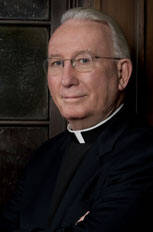You may not have noticed, but the listing of associate editors on the masthead of this journal is determined by seniority. When I returned from the Philippines in the Spring of 1972 to join the staff, my name was added at the end of a list of seven other Jesuits who had preceded me. Immediately ahead of me was John W. Donohue, who had joined the staff earlier that year; and second from the top, following Vincent S. Kearney, was Charles M. Whelan. Charlie Whelan had joined the staff in 1962; since Father Kearney’s death in 1981, he has presided at the head of the list as the senior associate editor.
This issue will be the last time in which the names of Charlie Whelan and John Donohue will be listed on the masthead. I know Drew Christiansen, our editor in chief, hopes that both Charlie and John will continue to contribute to our pages in the years ahead, but they are now freed of the regular editorial duties of an associate editor, after a combined 80 years of service to this “National Catholic Weekly,” which begins with this issue its traditional biweekly summer schedule.
Charlie Whelan’s 45 years on the masthead of America is the longest tenure of any editor in this journal’s 98-year history. For nearly all of that time, Charlie was also a member of the faculty of Fordham University’s School of Law. He had earned his law degree at Georgetown University while still a Jesuit scholastic and was admitted to the bar of the U.S. Supreme Court in 1958, the year he was ordained to the priesthood.
Charlie’s first article in these pages was published in 1961. In that article he took issue with a statement by the newly minted first Catholic president of the United States, John F. Kennedy, that the Constitution prohibited any designation of public funds for church-related schools. After observing that neither the president nor his attorney general “enjoy the reputation of great constitutional lawyers,” Charlie respectfully pointed out that the constitutional issue was far from settled. In the years that followed, Charlie assisted the legal counsel to the American Catholic bishops in arguing, with some success, that public money could be given to church-related schools for purposes of general education without violating the Constitution.
While teaching at Fordham and assisting the U.S. bishops, in addition to his editorial duties at America, Charlie also found time to serve as in-house counsel to a series of Jesuit editors in chief. His paralegal expertise—on such questions as the proper mixing of mint juleps on Kentucky Derby Day—was also sought and appreciated by the America House Jesuit community.
Like Charlie Whelan, John Donohue has had long and lasting links to Fordham University. After earning his doctorate in education from Yale University, John joined the faculty of Fordham’s Graduate School of Education and published what is regarded as a classic study of the Jesuit philosophy of education. In the early 1960’s, when Fordham ventured into women’s undergraduate education at its Rose Hill campus, John was asked to be the first dean of Thomas More College. The school established a high standard for academic excellence in its decade of existence, in the view of some separate but superior, until the idea of coeducational Jesuit colleges had become accepted and Fordham College began accepting women in 1974. By that time, John had left his decanal duties to become director of studies for Jesuits of the New York Province, a task that brought him into contact with young Jesuits of the “new breed,” to recall a phrase that had some currency in the 1960’s. In 1972 he welcomed the invitation of his good friend, Donald M. Campion, of very happy memory, to join the editorial staff of this journal.
Over the past 35 years, John Donohue has been one of the most prolific contributors to our pages, writing on a wide range of issues that affected all levels of education. His writing, filled with graceful allusions and sly observations, reflected a well-stocked mind and an irrepressible imagination. Among his many contributions were sympathetic profiles of a wide range of accomplished individuals, including a memorable tribute to his beloved Thérèse of Lisieux, when she was declared a doctor of the church in 1997. For members of the America House community, some of John’s best contributions never saw print. Over the years, his homilies at our Sunday noon liturgy, rich with original insight into the Christian life, were occasions of grace for many.
As Charlie begins his ninth decade and John approaches the close of his, and as America looks forward to its centenary in 2009, their legacy remains an enduring gift.
.








